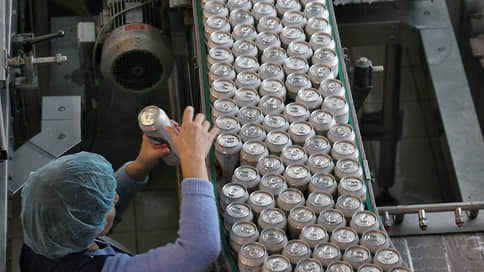Aluminum beer and soda cans may become more expensive
[ad_1]

Beer and soft drink producers are facing new cost increases. The Arnest group, which bought aluminum can plants from the American Ball in Russia, plans to increase prices due to rising costs and the rise in cost of the new plant project. As a result, prices for drinks may rise, which will lead to a decrease in demand, market participants fear.
Kommersant obtained a copy of a letter dated September 5, in which the main manufacturer of aluminum cans for beer and soft drinks in Russia, Arnest Packaging Solutions, notified customers of an increase in product prices from October 5, 2023 to December 31, 2024.
Arnest Group of Companies, which produces household chemicals and cosmetics (brands Deonica, Symphony, Prelest, Dichlorvos, etc.), bought three can production factories in the Moscow, Leningrad and Chelyabinsk regions from the American Ball Corporation in September 2022. In 2021, these enterprises occupied about 70% of the aluminum can market in the Russian Federation, the group reported.
As stated in the letter, the transition of factories to autonomous operation required the localization of IT infrastructure, which turned out to be a complex and expensive process. In addition, the increase in the key rate by the Central Bank led to an increase in the cost of borrowed funds used to build a plant in Ulyanovsk. The project was also negatively affected by the growth of the dollar and equipment prices, the document explains. The company promises to provide additional information about the rise in price of certain items.
Arnest Packaging Solutions explained to Kommersant that the proposed price increase is a forced measure related to external factors, and the company is “taking every effort to make packaging affordable and meet market needs”, continuing the construction of a plant in Ulyanovsk with a capacity of more than 1, 5 billion cans per year. The general director of the Russian office of the manufacturer of aluminum cans CanPack, Arsen Davidyan, did not answer Kommersant’s questions.
Anton Stelmakov, one of the founders of Famous Amazing Brands (Vanilla Flight and Anarchy drinks), says that Ball in Russia calculated prices for a can for large customers using a formula that takes into account LME aluminum prices, an inflation rate and a manufacturer’s premium. There was also a fixed price of $110 per 1,000 units for some customers, he adds.
Kommersant’s source in the market says that Arnest has a strong negotiating position due to its high market share and the company can raise prices by 10%. Maxim Novikov, President of the Union of Juice, Water and Beverage Producers, notes that in the context of the excise tax on drinks with sugar, labeling, rising prices for ingredients and logistics, any increase in the cost of a can can affect prices and contribute to a decrease in demand.
The general director of Volkovskaya Brewery, Alexei Aksel, specifies that the company’s aluminum can accounts for about 15-17% of its cost. According to him, such packaging is better suited for beer with a high content of hops, fruit purees and juices. Large brewing companies have a lower share of packaging in their cost structure, adds Mr. Axel. At the same time, adds Nikolai Zhelagin, founder of the “Take the Day Off” beer store chain, for beer in the mass segment, any increase in prices can lead to a decrease in demand, and for consumers of more expensive beer it is less noticeable and significant.
Arnest itself also has assets in the beer market. In August, the group bought out the Heineken United Brewery (OPKh) business of the Dutch Heineken in the Russian Federation, which includes seven factories producing beer under the Okhota, Bochkarev and other brands. Arnest Packing Solutions and OPH told Kommersant that deliveries of cans for OPH continue “on market principles and on equal terms with other players.” AB InBev Efes and Baltika did not provide any comments.
The Ministry of Agriculture confirmed an increase in prices for cans, which “may have negative consequences for producers amid rising costs in other areas.” The Aluminum Association noted that “increasing demand for cans is stimulating increased investment in production capacity.” In the future, “price equalization” is expected there.
[ad_2]
Source link





